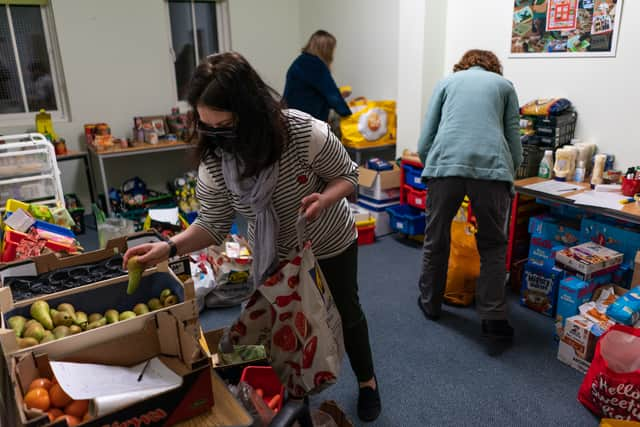Cost of living crisis in Glasgow: Research pinpoints areas most at risk
and live on Freeview channel 276
The data shows that residents in some Glasgow constituencies are seen as financially vulnerable, as energy bills, taxes and fuel prices soar, putting more pressure on people’s wallets.
Debt collection company Lowell and US-based think tank, Urban Institute, gave each UK constituency a rating out of 100 - what they call the ‘Financial Vulnerability Index’ - based on data such as the percentage of adults on social benefits and the share of Lowell consumers with high-cost loans.
What does the Glasgow data show?
Advertisement
Hide AdAdvertisement
Hide AdGlasgow North East has been ranked as the 82nd most vulnerable area in the whole of the UK (out of 650 constituencies), and the most vulnerable in Glasgow. It has been given a 55.2 out of 100.
The in-depth data shows that almost 20 per cent adults claim social benefits, while almost the same percentage of Lowell customers are in default.


Glasgow East came just behind, at 83rd, with a 55.1 rating. Glasgow South West fared little better, ranking 92 and being given a 54.5 rating.
Glasgow North West was given a 50.2 rating (182nd) Glasgow Central a 48.9 rating (216th) and Glasgow South a 48.2 rating (236).
Advertisement
Hide AdAdvertisement
Hide AdGlasgow West was the only Glasgow constituency outside the top half, being given a 44.6 rating (341st).
‘High levels of vulnerability’
Many households in major cities like Birmingham, Liverpool and Glasgow have been left financially “scarred” by the coronavirus pandemic, with high-cost debts and little in the way of savings.
It means they are far more vulnerable to the further economic shock of the cost of living crisis, according to the study by debt collection company Lowell and the US-based Urban Institute think-tank.
The researchers said people in these areas are still grappling with the effects of the pandemic, despite the recovery seen elsewhere.
Advertisement
Hide AdAdvertisement
Hide Ad“Many constituencies in these cities saw high levels of vulnerability before the pandemic, something that was exacerbated by successive lockdowns,” the study said.
“These areas have become ‘scar tissue’, immune to the general upswing in the economy seen as the pandemic ebbed.”
Birmingham, Manchester, Liverpool, Leicester and Newcastle are the biggest cities with this scarring effect, only seeing marginal improvement in their financial vulnerability since the peak of the pandemic.
John Pears, UK CEO of Lowell, said: “Right now, everyone’s talking about the increased cost of living, but the impact won’t be the same everywhere.
Advertisement
Hide AdAdvertisement
Hide Ad“There are lots of communities that still aren’t back to how they were before the pandemic and they are being hit again.
“With rising energy and food prices, we hope that these areas get the support they need, or the Government run the risk of levelling down in some of our biggest cities.”
Loading....
Signe-Mary McKernan, Vice President for Labour, Human Services, and Population at the Urban Institute, said: “While the United Kingdom overall experienced improvement in financial vulnerability, gaps remained in several regions, and high financial vulnerability persisted in places like Liverpool, Middlesbrough, and Birmingham.
“As policymakers look to guide recovery, supporting the financial health of residents can help families cope with inflation and stabilise communities.”
Advertisement
Hide AdAdvertisement
Hide AdThe researchers’ Financial Vulnerability Index scores an area from 1 to 100, with higher numbers signifying greater financial vulnerability.
It combines analysis of Lowell’s 9.5 million customer accounts with official statistics from the UK Government and Office for National Statistics.
It is based on six components that capture a household’s ability to manage daily finances and resist economic shocks: carrying debt in default, using alternative financial products such as payday loans, claiming work-related benefits, lacking emergency savings, holding a high-cost loan and relying heavily on credit.
Comment Guidelines
National World encourages reader discussion on our stories. User feedback, insights and back-and-forth exchanges add a rich layer of context to reporting. Please review our Community Guidelines before commenting.
